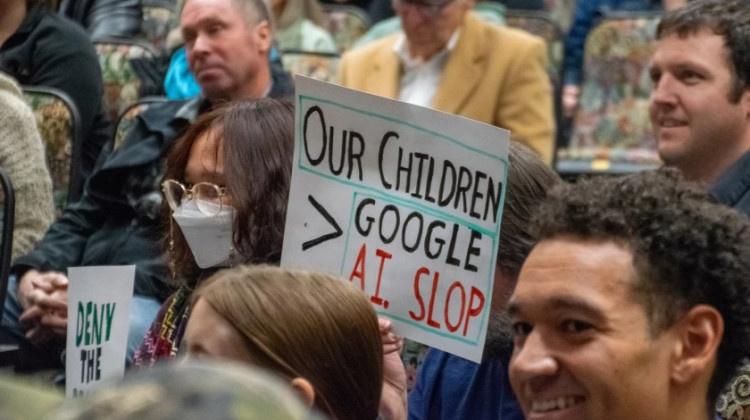
Republican Spencer Deery and Democrat David Sanders are running for the vacant Indiana Senate District 23 seat.
provided photosTwo candidates are running for Indiana’s 23rd Senate District seat: Republican candidate Spencer Deery and Democratic candidate David Sanders.
The district covers Fountain, Warren, Vermillion, and Parke counties along with sections of both Montgomery and Tippecanoe counties. The statehouse seat was left empty last year, after Republican Sen. Phil Boots (R-Crawfordsville) announced his retirement. Since then, a handful of Republicans vied for the position before conceding to Spencer Deery. Deery has worked as a member of Purdue University’s leadership since 2011 and touts his work alongside Purdue President and former Gov. Mitch Daniels. Democrat David Sanders is a Purdue professor and current member of West Lafayette’s City Council.
WFYI sent each of the candidates five questions to help voters learn more ahead of the election on Nov. 8. Their answers are presented in alphabetical order.
Editor’s note: Candidate responses were edited for AP Style and grammar, and any numbers used were checked for accuracy. When a statement required more clarification or could not be independently verified, WFYI reached out to candidates before publication. Those instances, and those candidate responses, are noted throughout in editors’ notes.

Spencer Deery
What do you see as the most pressing issue lawmakers will address in the upcoming legislative session?
It will take more than one session, but lawmakers need to chart a path to a more prosperous, post-pandemic normal than our current trajectory. Many Hoosier families are struggling and feeling a deep anxiety. Their incomes have not kept pace with inflation, and a recession is on the horizon. Students are still catching up from shutdown-induced learning loss. Some Indiana zip codes are among the unhealthiest in the country, mental health services are often inaccessible, and our hospital prices are among the most expensive in the nation.
Some of these problems didn’t start with the pandemic, but they were exacerbated by it and by politicians (mostly national) who have cared more about grandstanding than governing. I have never sought political office before, but I am doing so because I believe we need political newcomers with the qualifications, common sense and integrity to seek evidence-based solutions that lead to a more resilient economy, a better educational system, and affordable, accessible and efficient health care.
Indiana’s schools are facing numerous challenges including teacher shortages, racial achievement gaps, reading ability and declining college-going rate. What do you see as the state’s top education issues, and how would you address them?
Our education system is not on pace to produce the workforce of post-secondary educated workers we need to produce the economy we want.
Getting there starts with investments in early childhood education and extends throughout high school and into post-secondary programs. High-quality early childhood education needs to be accessible to more families; it has one of the best returns on investment we can make. Our high schools need more career advising and private-sector partnered, hands-on-learning that entices students to seek a post-secondary credential. For many, that will be from a traditional university, but we also need a stronger offering of high-skill apprenticeships and non-traditional post-secondary options that appeal to students for whom traditional college is not the best fit.
Indiana lacks affordable housing inventory and communities across the state deal with landlords who shrug off local health and safety violations. How would you address the state’s lack of affordable housing and laws to protect tenants from bad-acting landlords?
Rising prices are driven by many factors, but government policies that limit supplies or mandate costs are a contributor. My academic and professional training have taught me to turn to cost benefit analyses to judge when a regulation is justified by the benefits it creates and when it falls short and needs to be eliminated.
At the time I write this, the General Assembly has an ongoing task force that is studying this issue, and it's not my style to jump to conclusions before the research is done, but I will offer a few guiding principles. First, the General Assembly should take care to do no harm when attempting to address rising prices or tenant protections. Doing nothing is better than doing something that feels good but makes the housing shortage worse. Second, many of the government drivers of costs come not from state governments, but from local and county governments. I am not universally opposed to state intervention in such matters, but the General Assembly should be judicious in doing so because I believe voters in West Lafayette and Attica deserve the right to shape their home communities.
In recent legislative sessions, state lawmakers have tried to regulate local decision-making; two examples are wind turbine regulation and bail reform. How would you approach issues of local versus state control as a lawmaker?
My first instinct will always be to let the government closest to the people preside. But there are occasions when the state's interests are so significant or a municipality’s actions so misguided that state intervention is justified, such as when one local jurisdiction’s actions significantly harm the safety or prosperity of another jurisdiction. Regardless, the state should be cautious and selective when taking such actions, and a carrot is often the best choice rather than a mandate. Likewise, not all actions need to be through legislation. I will use the bully pulpit that comes with a position like state senator to persuade local constituencies and decisionmakers to enact ordinances that lift our state.
Indiana lawmakers voted to ban most abortions, with narrow exceptions for rape, incest, and certain serious medical complications and emergencies. Would you support the legislature revisiting Indiana’s abortion law? What would you change?
It's unlikely that we could move from campaign rhetoric to implemented public policy on this issue as fast as we did without some unintended consequences. I will be watching how the law impacts our medical workforce, maternal health, child poverty and other details. If we find the current law generates unworkable problems, it will be the General Assembly's duty to correct those.
I oppose elective abortions, especially in developing children, and I believe it’s correct to draw reasonable lines in defense of the innocent who cannot speak up for themselves, but I also believe the new law failed to adequately address the root causes of abortion or to help women and babies in difficult situations.
I support legislation that expands access to birth control directly from pharmacists without a doctor’s prescription. I also support reforms to reduce the costs of raising a child, whether that's through tax credits or a small-government approach to paid family leave. Meanwhile, some will want Indiana to revisit the issue to join other states in removing the exceptions in the current law. I will never vote to do so and suggest that as a Republican, I will have more influence in the General Assembly to keep Indiana’s exceptions in place and to pass legislation that helps women and babies in difficult situations.

David A. Sanders
What do you see as the most pressing issue lawmakers will address in the upcoming legislative session?
I only get one? Health care — from infant mortality to veterans’ health benefits, to affordable access to lifesaving pharmaceuticals, to a science-based prevention and treatment-focused approach to drug addiction, to equitable rural access to health care facilities, to hospital costs.
- Infrastructure — rural access to broadband internet and cell-phone service
- Sustainable economic development that includes rural areas
- Ensuring that Indiana is a leader in agricultural innovation
- An attorney general who is continuing the pattern of abusing his office
Indiana's schools are facing numerous challenges including teacher shortages, racial achievement gaps, reading ability and declining college-going rate. What do you see as the state's top education issues, and how would you address them?
Working to help our rural public schools have access to the resources they need to provide education that is comparable with that at excellent schools, such as those in West Lafayette – a matter of fundamental equity as well as essential to economic development. Educators must have the support they deserve so that they can be recruited and retained. They must be provided with the trust that as professionals they are qualified to create the curriculum. There must always be an emphasis on inclusion as well as diversity. Public funds for education should fund public education.
Indiana lacks affordable housing inventory and communities across the state deal with landlords who shrug off local health and safety violations. How would you address the state's lack of affordable housing and laws to protect tenants from bad-acting landlords?
These are very important issues. Local control is primary, and protections should not be overruled by state action. I would support a right to counsel for tenants facing eviction. Economic development in rural areas where housing exists, can be renovated or can be built should be prioritized.
In recent legislative sessions, state lawmakers have tried to regulate local decision-making; two examples are wind turbine regulation and bail reform. How would you approach issues of local versus state control as a lawmaker?
As a general principle I favor local control and have fought for such control as a West Lafayette city councilor and would continue to do so as state senator. I do not think the bail measure was appropriate.
Indiana lawmakers voted to ban most abortions, with narrow exceptions for rape, incest, and certain serious medical complications and emergencies. Would you support the legislature revisiting Indiana's abortion law? What would you change?
I have a well-established record for defending personal privacy against government intrusion. I am also a well-known advocate for full access to health care and women's rights. I would have opposed SB 1 and would welcome opportunities to work with my colleagues across the political divide who believe it should not be the law. Politicians who say that now that SB 1 is enacted we should also have health care and child care options for women – that they should have had all along – are being disingenuous. Also, it has become common for politicians to take extreme positions on these issues in the primary only to modify them to appear more mainstream in the general election.
How to vote in Indiana:
Vote by Mail Application deadline: Oct. 27, 2022, at 11:59 p.m. (local prevailing time). Election Day is Nov. 8, and you can find your polling place at the Indiana Voters Portal.
 DONATE
DONATE








 Support WFYI. We can't do it without you.
Support WFYI. We can't do it without you.